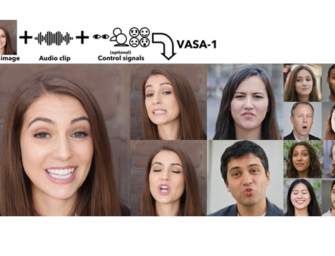Nvidia Debuts Generative AI Model for Medical Research

Nvidia and pharmaceutical startup Evozyne have debuted a generative AI model capable of producing proteins for use in medicine and other industries. The new Protein Transformer Variational AutoEncoder (ProT-VAE) is built on Nvidia’s BioNeMo framework and uses generative AI to rapidly create examples of synthetic protein designs that fit given parameters and speed up development. Nvidia and Evozyne have just published a paper with a couple of examples one that may cure a congenital disease and another that could consume carbon dioxide and combat global warming.
Protein Engineering AI
Nvidia started working with Evozyne, founded in 2020 by Paragon Biosciences, last year on designing ProT-VAE from BioNeMo. The idea is to apply deep learning and generative AI to biology the way it’s used for human language. The researchers concentrated on what’s known as the PAH gene, which instructs cells to produce phenylalanine hydroxylase, a digestive enzyme. If the gene isn’t coded correctly, people can develop phenylketonuria. The ProT-VAE model synthesized variants of PAH to see if it could produce a more effective version of the enzyme and potentially a genetic therapy. The model produced a new variant that was two and a half times better than the natural enzyme.
“We trained a model on protein data just like in other forms [of generative AI] but from amino acid sequences,” Nvidia vice president of healthcare Kimberly Powell told Voicebot in an interview. “With Evozyene, we evolved the model to create this new variant, which is the generative model. [The proteins] are put into families, and [researchers can] fine-tune the model for the specific family and not need a lot of data. At which point you can say, ‘hey, model, generate me a ton of new amino acid sequences never seen in nature before.'”
The researchers can use mathematical language to describe other parameters for the proteins, iterating and fine-tuning the model as much as they choose. It will then produce protein designs suitable for the described purpose, and researchers can comb through and pick out promising options to chemically synthesize for real-world testing.
“This is the evolution of methods to do protein engineering,” Powell said. “It’s putting biology into information science and turning it into engineering.
Generative Biology AI
Applying generative AI to biology is still a new idea but is on the cusp of rapid growth. Drug discovery startup Variational AI recently filed two provisional patents for two novel small molecules that could treat COVID-19 designed with generative AI on its Enki platform. Its variational autoencoder (VAE) was trained on a mix of public and proprietary datasets to produce the protease inhibitors, which could play a key role in future COVID-19 antiviral treatments. With Nvidia’s success in its partnership with Evozyne, this could become a standard approach to medical and biological research.
“This is an absolutely unprecedented way to understand biology. BioNeMo is in early access, but the traction is amazing. It’s all built on the shoulders of what we’ve accomplished with natural language processing,” Powell said. “The network architecture is different, and how you use the model in biology is very different from ChatGPT or language use cases, but it’s all about understanding relationships. We’re still just scratching the surface.”
Follow @voicebotaiFollow @erichschwartz
Generative AI Produces COVID-19 Treatments Patented by Drug Discovery Tech Startup Variational AI
Nvidia Presents Bio-Megatron Medical Speech Transcription System
Nvidia Unveils Virtual Human Builder for Metaverse Characters








